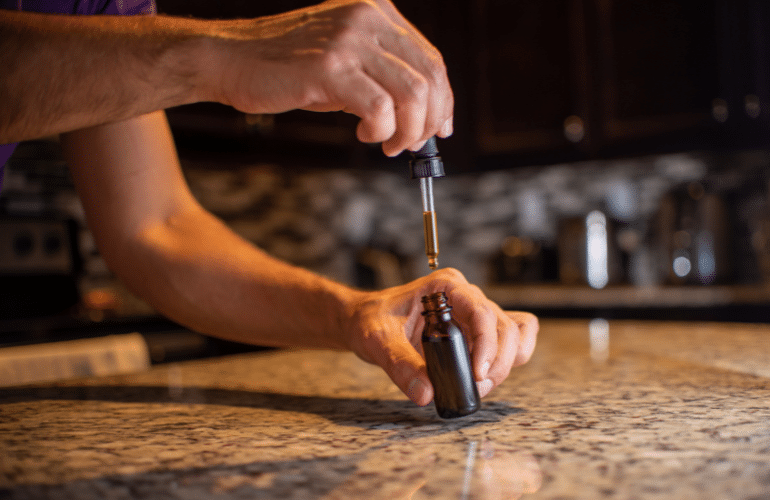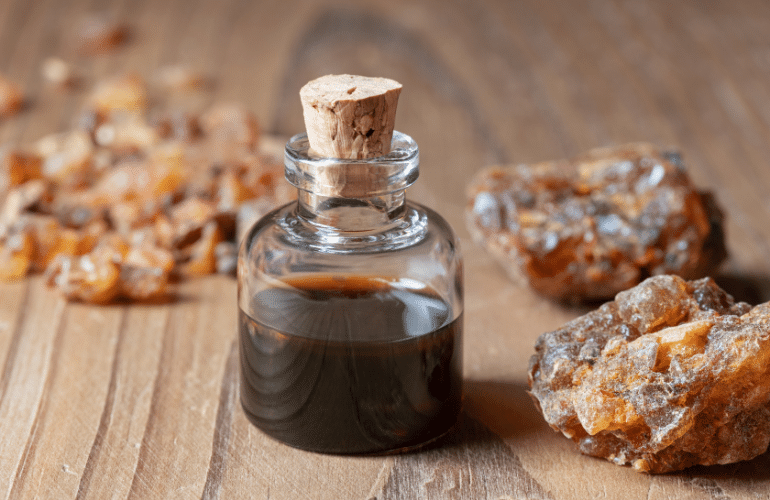Aromatherapy, Essential Oils
The Fascinating History of Myrrh Oil Uses
Have you ever wondered about the fascinating history and versatile uses of myrrh oil?
From ancient times to the modern day, myrrh oil has played a significant role in traditional medicine, religious ceremonies, perfumery, skincare, trade, and aromatherapy. Its warm, spicy aroma and therapeutic properties have made it a valuable commodity in international trade and a popular ingredient in luxury products.
Whether you’re interested in the historical significance or modern myrrh oil uses, myrrh oil is sure to fascinate and intrigue you.
The Origins of Myrrh Essential Oil: A Brief Introduction
Myrrh oil is extracted from the resin of the Commiphora tree. The tree is native to the Middle East and North Africa.
Myrrh has been used for over 5,000 years in traditional medicine. It was valued for its healing properties and was used to treat a variety of ailments.
Myrrh oil was also an important ingredient in religious ceremonies in ancient Egypt, Greece, and Rome. It was considered a symbol of purity and was used to embalm the dead.
Myrrh oil was also a valuable commodity in ancient trade routes. Today, myrrh oil uses vary from healing and therapeutic properties to aromatherapy and skincare.
Ancient Myrrh Oil: Its Significance in Traditional Medicine
Myrrh oil has been used in traditional medicine for thousands of years. It was used by the ancient Egyptians, Greeks, and Romans to treat a variety of ailments.
Myrrh oil was believed to have antiseptic, anti-inflammatory, and pain-relieving properties. It was used to treat wounds, infections, and respiratory problems.
In traditional Chinese medicine, myrrh oil was used to improve blood circulation and relieve pain. Myrrh oil was also used in Ayurvedic medicine to treat digestive problems and inflammation.
In medieval Europe, myrrh oil was used to treat the plague and other infectious diseases. Myrrh oil was also used topically to promote skin health and reduce the appearance of wrinkles.
Myrrh Oil in Religious Ceremonies: From Ancient Egypt to Modern Times
Myrrh oil has played a significant role in religious ceremonies for thousands of years.
In ancient Egypt, myrrh oil was used in the embalming process and as an offering to the gods. In Judaism, myrrh oil was a key ingredient in the holy anointing oil used to consecrate priests and the Tabernacle.
In Christianity, myrrh oil was one of the gifts brought by the Magi to the infant Jesus. It was also used to anoint the body of Jesus after his crucifixion.
In Islam, myrrh oil is mentioned in the Quran as a blessed tree and a source of healing. Myrrh oil continues to be used in religious ceremonies around the world today.
It is used in Christian and Orthodox churches as an ingredient in incense and as a symbol of the gifts brought by the Magi. In Hinduism, myrrh oil is used as an offering to the gods during puja ceremonies.
Myrrh Oil in Perfumery: Its Role in the Fragrance Industry
Myrrh oil has been used in perfumery for thousands of years. It has a rich, warm, and spicy aroma that blends well with other scents.
In ancient times, myrrh oil was used to create incense and perfume for religious ceremonies. It was also used as a luxury item by wealthy individuals.
In the Middle Ages, myrrh oil was used as a base note in perfumes and was believed to have aphrodisiac properties. During the Renaissance, myrrh oil was a popular ingredient in perfumes and cosmetics.
In the 20th century, myrrh oil was used by French perfumers to create classic fragrances such as Chanel No. 5 and Opium by Yves Saint Laurent.
Today, myrrh oil is still used in perfumery and is prized for its unique scent and long-lasting properties. It is used as a base note in many high-end perfumes and is often blended with other essential oils to create complex fragrances.
Myrrh oil is also used in luxury skincare products for its moisturising and anti-aging properties. The use of myrrh oil in perfumery and cosmetics continues to be an important part of the fragrance industry.
Myrrh Oil in Skincare: Historical and Modern Applications
Myrrh oil has been used in skincare for thousands of years. In ancient Egypt, myrrh oil was used in beauty treatments to promote healthy skin and reduce the signs of aging.
It was also used to heal wounds and prevent infections. In Ayurvedic medicine, myrrh oil was used to treat skin conditions such as eczema and psoriasis.
Today, it is often used in natural and organic skincare products because of its gentle and non-irritating nature. Myrrh oil is also used in luxury skincare products for its ability to improve skin tone and reduce the appearance of wrinkles.
Myrrh oil can be found in a variety of skincare products, including moisturisers, serums, and face masks. Its historical and modern applications make myrrh oil a popular ingredient in natural and luxury skincare products today.
The Role of Myrrh Essential Oil Aromatherapy: Its Therapeutic Properties
Myrrh essential oil is popular in aromatherapy. It has a warm, earthy scent that is believed to have therapeutic properties.
Myrrh oil is used to promote relaxation, reduce stress and anxiety, and improve mood. It is also believed to have anti-inflammatory and antimicrobial properties, making it useful in treating respiratory infections and skin conditions.
Myrrh oil is often used in meditation and spiritual practices to promote a sense of grounding and calm. It is also used in massage therapy to promote relaxation and reduce muscle tension.
Myrrh oil can be used on its own or blended with other essential oils to create unique aromatherapy blends. The role of myrrh oil in aromatherapy is an important one, and its therapeutic properties make it a popular choice among practitioners and enthusiasts alike.
Realise the Potential of Myrrh Essential Oil Today
The history of myrrh essential oil uses is truly fascinating. From ancient times to the present day, myrrh oil has played an important role in medicine, spirituality, trade, and self-care.
Whether you’re interested in its historical significance or its modern applications in perfumery, skincare, and aromatherapy, myrrh oil is a versatile and valuable ingredient.
With its unique aroma and therapeutic properties, myrrh essential oil uses continue to evolve and inspire. Consider incorporating myrrh oil into your daily routine to experience its benefits for yourself.



